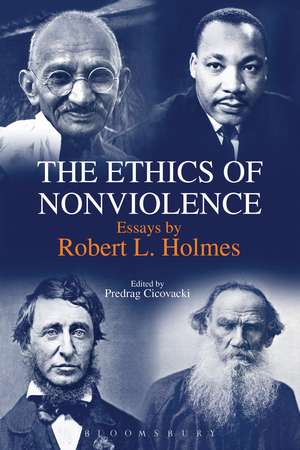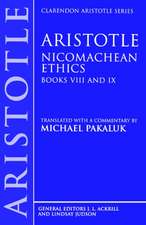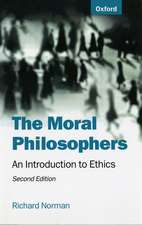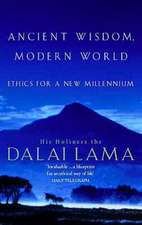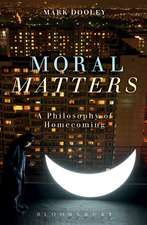The Ethics of Nonviolence: Essays by Robert L. Holmes
Editat de Dr. Predrag Cicovacki Autor Professor Robert L. Holmesen Limba Engleză Paperback – 14 aug 2013
| Toate formatele și edițiile | Preț | Express |
|---|---|---|
| Paperback (1) | 238.67 lei 43-57 zile | |
| Bloomsbury Publishing – 14 aug 2013 | 238.67 lei 43-57 zile | |
| Hardback (1) | 832.26 lei 43-57 zile | |
| Bloomsbury Publishing – 14 aug 2013 | 832.26 lei 43-57 zile |
Preț: 238.67 lei
Preț vechi: 306.22 lei
-22% Nou
Puncte Express: 358
Preț estimativ în valută:
45.67€ • 47.81$ • 37.79£
45.67€ • 47.81$ • 37.79£
Carte tipărită la comandă
Livrare economică 07-21 aprilie
Preluare comenzi: 021 569.72.76
Specificații
ISBN-13: 9781623568054
ISBN-10: 1623568056
Pagini: 272
Dimensiuni: 152 x 229 x 20 mm
Greutate: 0.41 kg
Editura: Bloomsbury Publishing
Colecția Bloomsbury Academic
Locul publicării:New York, United States
ISBN-10: 1623568056
Pagini: 272
Dimensiuni: 152 x 229 x 20 mm
Greutate: 0.41 kg
Editura: Bloomsbury Publishing
Colecția Bloomsbury Academic
Locul publicării:New York, United States
Caracteristici
Explores the ethics and philosophy of nonviolence, both secular and religious
Notă biografică
Robert L. Holmes is Professor Emeritus of Philosophy at the University of Rochester, USA. His main research is in philosophy of war, the ethics of nonviolence, and contemporary moral problems. He is the author of Basic Moral Philosophy (Wadsworth, 4th edition, 2006) and On War and Morality (Princeton University Press, 1989), co-author of Philosophical Inquiry (Prentice Hall, 2nd edition, 1968), and co-editor of Nonviolence in Theory and Practice (Wadsworth, 3rd edition, 1990). He has published over 75 scholarly papers.Predrag Cicovacki is Professor of Philosophy at the College of the Holy Cross, MA, USA. He has published over fifty philosophy papers published in English, Serbian, German, Russian, Chinese, and Slovenian and is the author or editor of nine books, including Albert Schweitzer's Ethical Vision: A Sourcebook (with Introduction, Oxford University Press, 2009).
Cuprins
Introduction 1. John Dewey's Moral Philosophy in Contemporary Perspective 2. Consequentialism and its Consequences 3. The Limited Relevance of Analytical Ethics to the Problems of Bioethics 4. The Concept of Corporate Responsibility 5. University Neutrality and ROTC 6. The Philosophy of Political Realism in International Affairs 7. The Challenge of Nonviolence in the New World Order 8. St. Augustine and the Just War Theory 9. War, Power, and Nonviolence 10. Violence and Nonviolence 11. The Morality of Nonviolence 12. Terrorism, Violence, and Nonviolence 13. Understanding Evil from the Perspective of Nonviolence 14. Jallianwala Bagh and the Boston Tea Party: Nonviolent Roots of the Indian and American Anti-Imperialism 15. Toward a Nonviolent American Revolution 16. My (Non-)Teaching Philosophy Appendix 1: An Interview with Robert Holmes Appendix 2: Bibliography of Robert Holmes' Publications
Recenzii
Long before Richard Rorty and Hilary Putnam praised in print the insights of William James and John Dewey, Robert Holmes shed light on the philosophical importance of the classical pragmatists. Long before Larry May and Jeff McMahan debated the merits of pacifism, just war theory, and war realism, Robert Holmes made the case for contingent pacifism. Holmes's distinctions among and insights concerning the various forms of pragmatism, pacifism, and nonviolence help debunk the easy dismissal of these views. The collected papers of Robert Holmes shed light on why those who summarily reject all forms of pragmatism, pacifism, or nonviolence do so because they continue to misrepresent these important but too often trivialized philosophical views.
This welcome collection of essays by Robert L. Holmes reminds us why he is the leading theorist of nonviolence at work today. His careful and thorough treatment of issues together with his clear writing and deep insight all further the inevitable nonviolent revolution required for our violent world to be transformed so as to allow a sustainable human future. Such important work deserves very wide circulation, readership, and consideration.
The Ethics Of Nonviolence is by far the best book on the subject. Dr. Holmes has understood the nuances of the Gandhian Philosophy as few others have. His understanding of the philosophy and his ability to impart it to students is so unique that I often wish I was a young student again under his tutelage. Dr. Cicovacki must be commended for this outstanding collection of lectures.
Holmes has written another cogent book on nonviolence that is also accessible to nonspecialists. His treatment of Dewey is excellent, as well as his reasoning about pragmatic and principled nonviolence. For readers familiar with his work, the appendix with Cicovacki's interview of him will be much appreciated.
The Ethics of Nonviolence presents the clear and penetrating thinking of one of the foremost theorists of nonviolence in the world today. The readings not only offer insight into the development of Robert L. Holmes's thought, but more importantly, they reveal the theoretical and practical heart of his ethic of nonviolence, woven from such disparate threads as the ethics of Dewey, Mill, and Kant, critiques of Robert Nozick's libertarianism and St. Augustine's defense of just war, and also Holmes's own views on such contemporary yet eternal topics as evil, terrorism, and the philosophy of teaching. The final chapters treat readers to both his wisdom and his sense of humor.
This welcome collection of essays by Robert L. Holmes reminds us why he is the leading theorist of nonviolence at work today. His careful and thorough treatment of issues together with his clear writing and deep insight all further the inevitable nonviolent revolution required for our violent world to be transformed so as to allow a sustainable human future. Such important work deserves very wide circulation, readership, and consideration.
The Ethics Of Nonviolence is by far the best book on the subject. Dr. Holmes has understood the nuances of the Gandhian Philosophy as few others have. His understanding of the philosophy and his ability to impart it to students is so unique that I often wish I was a young student again under his tutelage. Dr. Cicovacki must be commended for this outstanding collection of lectures.
Holmes has written another cogent book on nonviolence that is also accessible to nonspecialists. His treatment of Dewey is excellent, as well as his reasoning about pragmatic and principled nonviolence. For readers familiar with his work, the appendix with Cicovacki's interview of him will be much appreciated.
The Ethics of Nonviolence presents the clear and penetrating thinking of one of the foremost theorists of nonviolence in the world today. The readings not only offer insight into the development of Robert L. Holmes's thought, but more importantly, they reveal the theoretical and practical heart of his ethic of nonviolence, woven from such disparate threads as the ethics of Dewey, Mill, and Kant, critiques of Robert Nozick's libertarianism and St. Augustine's defense of just war, and also Holmes's own views on such contemporary yet eternal topics as evil, terrorism, and the philosophy of teaching. The final chapters treat readers to both his wisdom and his sense of humor.
